India’s Sustainable Fashion Ecosystem Gets A Boost From 80 Top Innovators
Date:

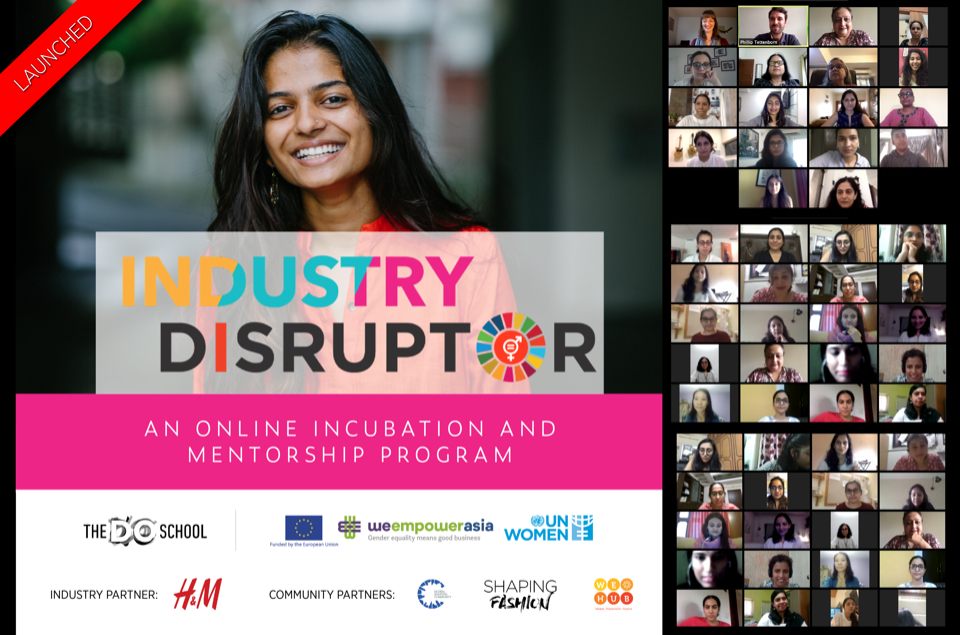
New Delhi, India - Eighty selected start-ups passionate about gender equality and eager to make more sustainable and women-benefiting fashion can now offer a better future to India’s fashion world, thanks to WeEmpowerAsia’s incubator program, Industry Disruptor.
Launched in May 2020, the Industry Disruptor is an incubation and mentorship initiative by the joint EU-UN Women programme WeEmpowerAsia that provides promising entrepreneurs the chance to learn from top industry experts, explore imminent sustainability problems in the fashion supply chain and develop feasible and inclusive solutions to them.
WeEmpowerAsia has organized an online training course for the 80 finalists with outstanding innovation proposals, with help from social enterprise The DO School. The 6-week program, launched on World Youth Skills Day on July 15, includes a mix of weekly webinar sessions and ongoing knowledge exchange in a robust peer community, including ways WeEmpowerAsia can support them during and after the COVID-19 crisis (see video recordings below).
Up to 20 most promising ventures will be invited to the next bootcamp stage, where they will co-create solutions with industry and corporate partners that include H&M, Tchibo and WE HUB. The 3-month incubation will cover individual coaching, business development strategies and market access.
From biodegradable glitter to fabrics made from plastic, orange fibers or rose petals – these are the next generation of innovations to transform the fashion industry for good.
The finalists included Ihitashri Shandilya, Founder and CEO of MITHILAsmita, an award-winning social enterprise centred around India’s Madhubani paintings. She aims at using the power of marketing, technology and strategic partnerships to bring sustainability in the rural artisan sector, with a focus on women artisans and cultural preservation.
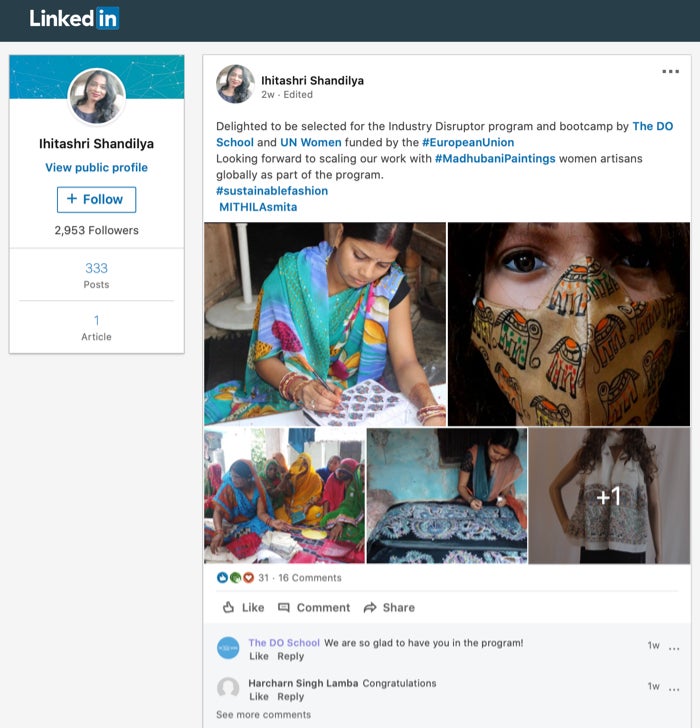
“Looking forward to scaling our work with Madhubani Paintings women artisans globally as part of the [Industry Disruptor] program,” Shandilya said in a LinkedIn post.
Gauri Gopal Agrawal, Founder of sustainable home and lifestyle brand Skilled Samaritan Foundation, said she was first intrigued to take up her entrepreneurship journey after seeing that many educated and skilled women trying to succeed in her city lacked opportunities due to social norms and gender prejudices. She said the Industry Disruptor training infuses the circular economy model, which her company has adopted to tackle the issue of plastic pollution and waste fabrics from factories by leveraging the skills of women artisans to develop designer products from MLP (Multi-layer plastic) and textile waste.
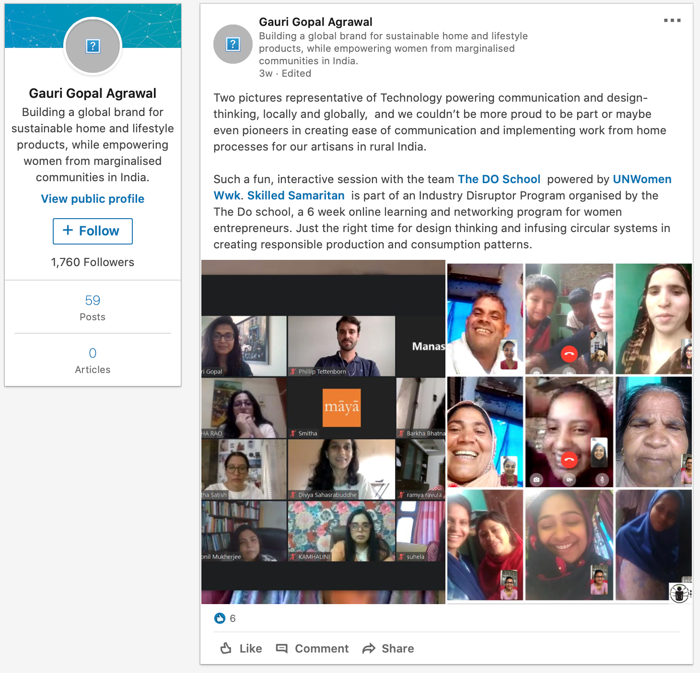
“We couldn’t be prouder to be part of, or maybe even as pioneers in, creating ease of communication and implementing work from home processes for our artisans in rural India,” Agrawal said in a LinkedIn post.
Similarly, Nitika Sonkhiya, Co-Founder of ONEarth, shared her excitement at the opportunity to scale her venture, which promotes lifestyle products made out of natural and eco-friendly materials such as bamboo and coconut shell. “I think it is high time for us to take responsibility and ownership for our way of life. We have seen the consequences of taking this planet for granted; this is what I have pursued for the past 4 years,” Sonkhiya said in her LinkedIn post.
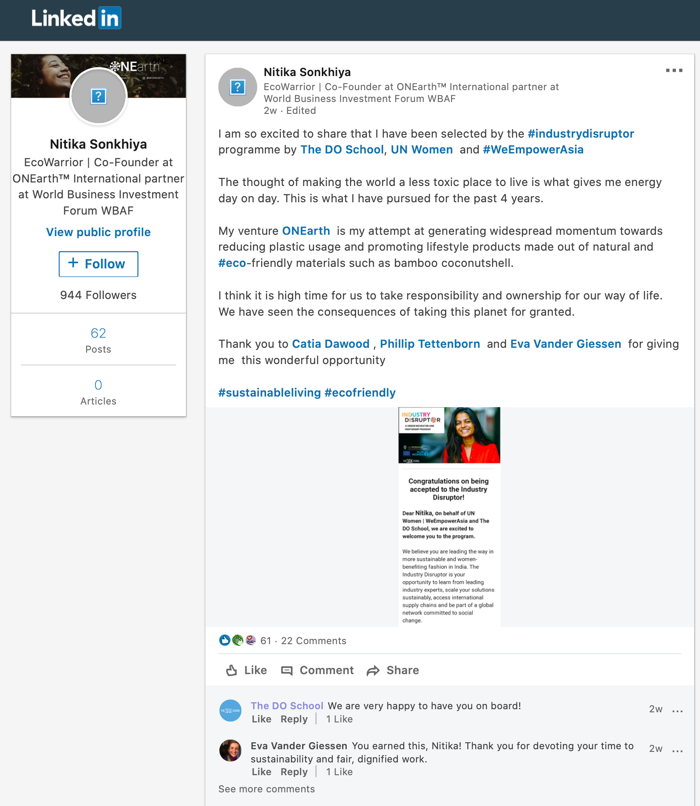
With 15 years of experience as a textile entrepreneur, Krittika Sharma, Founder and Creative Director of Krittika Sharma Textiles, said she was delighted to be part of such a power-packed network of women and in warm learning and sharing environment despite the lockdown.
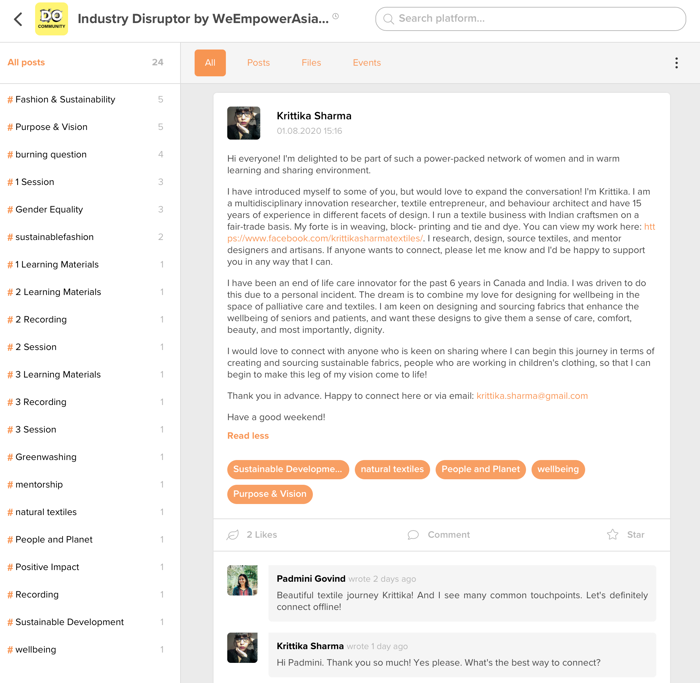
“The dream is to combine my love for designing for wellbeing in the space of palliative care and textiles. I am keen on designing and sourcing fabrics that enhance the wellbeing of seniors and patients and want these designs to give them a sense of care, comfort, beauty, and most importantly, dignity,” Sharma said in a blog post on the dedicated online forum, The DO Community.
During the training sessions, the entrepreneurs learned about building their business brand, driving sales and attracting new customers. They also discussed their vision, purpose and actions they could take during and after the COVID-19 crisis to scale and co-create products and solutions for impact.
UN Women’s WeEmpowerAsia Regional Programme Manager Katja Freiwald has said: “We believe the Industry Disruptor project can boost India’s entrepreneurial ecosystem, promote innovation in the county and contribute new solutions that the fashion industry of the future will require.”
“Unlocking the potential of women entrepreneurs is not only going to bring major benefits to businesses but will be a powerful driver of development and bring society closer to the Sustainable Development Goals, particularly Goal 5 on gender equality,” added Freiwald.
According to India’s Sixth Economic Census, only about 14 per cent of women own or run businesses; more than 90 per cent are microenterprises and about 79 per cent are self-financed.
With the government making all-out efforts to stimulate entrepreneurship and innovation, more female entrepreneurs are emerging in India and breaking the glass ceiling across industries. Yet within the fashion supply chain, many women continue to be underrepresented in leadership roles and continue to face persistent discrimination which has been exacerbated by the COVID-19 crisis.
Katherin Kirschenmann, Founder of The DO School, has stated: “The effects of COVID-19 on the entire fashion industry, including its international supply chains and its predominantly female workforce, are huge and are adding to the already-existing sustainability challenges faced by the industry. I think this project is an opportunity to forge new coalitions to better resolve the problems together. With the Industry Disruptor we will focus on joint solutions and sharing best practice.”
Katherin added that the project takes a facilitative approach to strengthen the entrepreneurial ecosystem, which will include skill-building and networking opportunities for women, and the advocacy and promotion of renewed perspectives and value to women-led enterprises and solutions.
Nishtha Satyam, Deputy Country Representative of UN Women India, highlighted the importance of this engagement: “In India, women entrepreneurs are demonstrating and proving their talent, capability to innovate and high capacity for risk in every sector—traditional and non-traditional. With programs like the Industry Disruptor, our aim is to promote an inclusive business environment and equip them with skills to create and lead gender responsive enterprises."
The India Chapter of the Industry Disruptor has garnered overwhelming response from entrepreneurs of all genders in India, with more than 300 applications received to date. It serves as an important platform to share industry ideas and know-hows and access a broad network of fashion start-ups, experts and stakeholders. The Challenge is expected to be launched in Europe in August.
List of online training sessions (July 15-August 19, 2020):
- July 15 - Industry Disruptor online training sessions (vision, purpose and impact)
- July 22 - Industry Disruptor online training sessions (fashion and sustainability)
- July 29 - Industry Disruptor online training sessions (gender equality and operations)
- August 5 - Industry Disruptor online training sessions (crisis management and resilience)
- August 12 - Industry Disruptor online training sessions (marketing and engaging customers)
- August 19 - Industry Disruptor online training sessions (funding, collaboration and scaling)
Related news:
- India’s companies making big waves in the fashion industry
- UN Women and WE HUB to Catalyze India’s Fashion Industry
Watch videos of past Industry Disruptor online training sessions:
For more information, please contact:
Suhela Khan
Country Programme Manager, WeEmpowerAsia India
UN Women India
Email: suhela.khan@unwomen.org
Bovornpong Vathanathanakul
Communications Analyst, WeEmpowerAsia
UN Women Regional Office for Asia and the Pacific
Email: b.vathanathanakul@unwomen.org
About Industry Disruptor
The Industry Disruptor project is a collaborative effort between UN Women and The DO School mobilizing female entrepreneurs and female-led enterprises in India to tackle key sustainability challenges in the textile and fashion industry. The project is part of a wider initiative of the WeEmpowerAsia (WEA) programme, which is funded by the European Union under its Partnership Instrument and implemented by UN Women Regional Office for Asia and the Pacific.
About UN Women
UN Women is the United Nations entity dedicated to gender equality and the empowerment of women. A global champion for women and girls, UN Women was established to accelerate progress on meeting their needs worldwide.
About the European Union
The European Union is made up of 27 member States who have decided to gradually link together their know-how, resources and destinies. Together, during a period of enlargement of 50 years, they have built a zone of stability, democracy and sustainable development while maintaining cultural diversity, tolerance and individual freedoms.
About WeEmpowerAsia
WeEmpowerAsia, a programme funded by and in partnership with the European Union seeks to increase the number of women who lead and participate in business in China, India, Indonesia, Malaysia, the Philippines, Thailand and Viet Nam. A key component of the programme is to mobilize private sector companies to become gender-responsive by committing to and implementing the Women’s Empowerment Principles (WEPs). For more, visit www.weempowerasia.org.
About The DO School
The DO School is a global organization that enables a purposeful economy that is sustainable and innovative. They are powered by a community of Doers, innovators, and experts from 100+ countries. Through their unique methodology, they support individuals and organisations to transform with purpose: To turn co-created ideas into action, equip people to lead and build movements, and create real change. For more: https://www.thedoschool.com